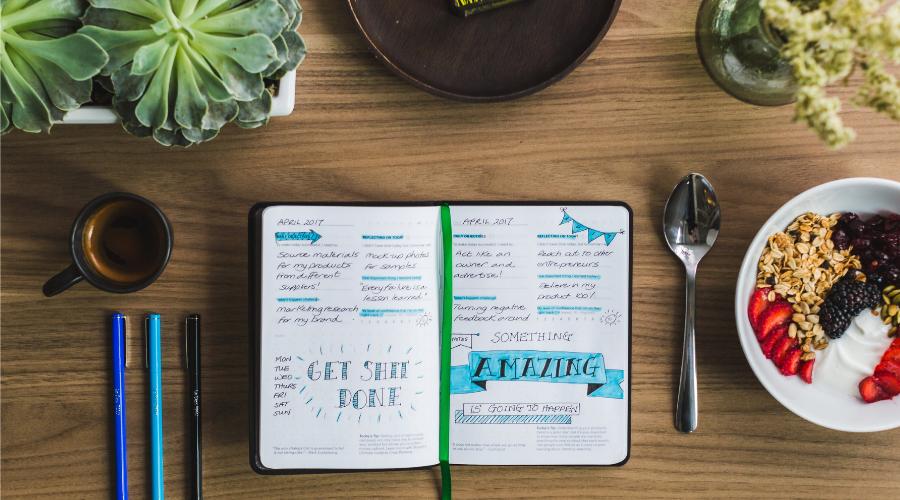Is Journaling A Powerful Habit? A Guide To Help You Start Journaling
This blog/post may contain links to third party merchants. Smarty earns commissions on purchases you make using these links.

The New Year is here, and we know you would love to culminate a new hobby. You might pick from a list of habits like learning your favorite instrument, hitting the gym, or learning a new skill. These habits will help keep you happy and motivated while learning a new skill, but what about your well-being? Would you take a few minutes from your busy schedule if we told you could improve your mental health? We’re sure you would because who wants to stay stressed and locked up in the bubble of anxiety and depression? So, here’s one of the best solutions: Journaling!
Maintaining a journal will help to keep track of your improvements, feel your feelings, and express gratitude, which is a great way to keep you away from stress and anxiety. You may also track your New Year’s resolutions and document your personal growth to stay productive through journaling. Read the article to understand the concept of journaling and how to start. And yes, our prompts will give you ideas on what topics to write about!
Benefits of Journaling
Journaling is an essential tool to improve your mental well-being and helps you stay productive and focus on your goals. Here are a few benefits of Journaling:
1. Journaling for Mental Health – Is This Habit Beneficial?

- Manage Stress and Anxiety – Journaling helps you embrace your fears and prioritize your problems with self-talk. With this, you could identify your triggers, know your vulnerabilities, understand them, and come up with solutions, thereby managing your stress and anxiety.
- Coping with Depression – According to WebMD, Journaling can help you reduce mental distress and could cope with depression. Journaling enables you to understand your behavioral patterns and express your difficult emotions. So, writing for at least three days a week for up to 12 weeks is said to increase feelings of well-being.
- Boosts Emotional Intelligence – Writing down your thoughts gives an outlet to your emotions and develops self-awareness, giving you the ability to understand a situation better and helps you manage it well.
- Improves Sleep Quality – Journaling relaxes your mind by clearing all your thoughts and helping you fall asleep quickly, especially when you write before bedtime.
- Promotes Gratitude – Gratitude journaling is the popular way to perceive our life positively. The idea of showing gratitude helps us count our blessings, bringing a ray of hope and helping to navigate the negativity in our lives.
- Enhances your Mood – Seeing your progress can help you clear your mind, boost your self-esteem, and to improve your mood.
2. Journaling for Productivity – Can Your Life Come on Track?

- Helps in Achieving Goals – Journaling helps prioritize tasks, tracks your progress, identifies roadblocks, and builds a continuous loop to improve your work, bringing clarity to your goals.
- Inspires Creativity – With Journaling, you can battle negative thoughts, visualize new ideas, listen to your inner voice, and nurture your thoughts, inspiring creativity and welcoming new opportunities.
- Improves Communication Skills – Writing helps you structure your thoughts, express yourself better, and improve your overall communication skills.
- Enhances Problem-Solving Ability – Journaling helps you learn to organize your thoughts, giving you a scope to break down complex ideas into simpler ones and get an added advantage.
- Helps to Reflect on your Day – Through Journaling, you can revisit daily activities, track your habits, organize your thoughts, build a schedule, record your small wins, and reflect on your emotions, helping you in overall personality development.
- Boosts Memory – Journaling calls for brain-storming. As you write, your brain processes the information better, and you tend to focus better and retain thoughts and ideas.
Steps to Effectively Start Journaling in 2023

- Know your Purpose – Understand the purpose of journaling and why you are starting to write about important and sensitive aspects of your life. Ask yourself these questions: “Are you using the journal as an outlet for your emotions?”, “Are you looking to write about your blessings through this journal?”, “Are you thinking of organizing your tasks and planning your life, or are you wishing to track your mood regularly?”. Knowing the purpose of your journaling will help you understand your motives and keep you focused on writing and maintaining the streak.
- Determine what Journaling Method Works Best – Journaling can be done on your computer, smartphone, journal apps, or just with a pen and paper. Finding out the tools that are right for you will help you to be consistent with journaling.
- Start Writing – The best and easy way to practice the habit of Journaling is to start writing. It’s that simple! Whether it is in your gratitude journal, bullet journal, manifestation journal, future-self journal, or mood journal, write your plans and thoughts regularly and see the magic within a few days.
- Make Journaling a Habit – Write your inner thoughts, feelings, events, and activities regularly or set goals, track progress, and document your personal growth as often as possible. Journaling will become a habit after practicing and writing on daily bases or as frequently as you can – please note that there is no “right” or “wrong” way to do it.
Also Read: Effective Tips to Help you Stay Organized and Live Stress-Free Life
Journaling Tips: Make the Best From Journaling

- Set Goals – Set your journaling goals. Make a note of what you want to journal and what the frequency is. Ask yourself, “Do you want to write daily, weekly, or twice a month?”. Setting your goals helps you understand yourself better.
- Set Timings – The biggest challenge for most people wanting to do journal writing is finding the time to write regularly. Like anything else, you are more likely to complete a task when you make it part of your daily routine – if you plan your day in your head or planner, be sure to schedule a time for writing. You can also set a reminder or schedule the time on your digital calendar or phone, especially if you can’t do it regularly. You can even create a to-do list and add your journaling routine to it. Using creative ideas like visualizing your to-do list can help you stick to your tasks.
- Get Journal Writing Tools – Journaling is a highly personal practice. Choosing tools that work best for you, such as a pen and notebook or a digital app will help you to put your emotions and experiences down easier. For instance, investing in a great notebook for visual journalers is one of the best options. Also, having a nice black pen that is easy to write with can enhance your journaling experience.
- Start Small – Don’t wish to write a big essay or several pages in the beginning. This will hinder your journaling process. Start small. You can even set a time limit of 10 minutes, 30 minutes, or any desired time. This will motivate you to journal your thoughts regularly.
- Stay Consistent – Being consistent with your journal writing habit will benefit you with personal growth, expressing gratitude, and much more. Remember that consistency is the key to reaching goals and growing and overcoming conflicts.
- Ditch the Perfection – You don’t need to be perfect while writing about your thoughts, feelings, and emotions. Stop focusing on the concept of perfection and focus on writing what is important to you. Avoid focusing on grammar, punctuation, and spelling errors because journaling is your reflection, not an assessment.

- Use Journaling Prompts – When you’re confused about what to write, journaling prompts are the best way to get off from the mind block. With journaling prompts, you’ll get ideas on what to write. Here are 15 journaling prompts we suggest you try:
- Write about the positive things that happened in your life in the past week.
- Express your gratitude and write about what you are grateful for.
- Write a letter to your past, confessing all your regrets and the lessons you learned till now.
- Write a letter to your future, figuring out your plans and goals.
- Write about your fears and the reasons behind them.
- Write about five things you wish to change this year.
- List a few habits you wish to adopt this year.
- Write about the happy and proud moments in your life.
- Prepare your shopping list and write about the important purchase you wish to make this year.
- Create your travel bucket list and write about your travel goals.
- Write about your memories from the last vacation and how you wish to focus on your goals post-vacation.
- Write about your health and fitness goals and how you wish to achieve them.
- Write about your money goals and how you wish to achieve them.
- List down your favorite winter activities you are gonna try this year.
- Write about your self-care routine and how it’s helping you develop your confidence.
- Reward Yourself: Review your journal at regular intervals to track your progress and reward yourself for your accomplishments. This will help you stay on track and build the hobby of Journaling consistently.
Journaling is therapeutic and the pathway to self-discovery. Use this great hobby to eliminate negative thoughts, manage emotions, and bring back your sanity. Have fun journaling using these tips and Journaling prompts.
Happy Journaling!







